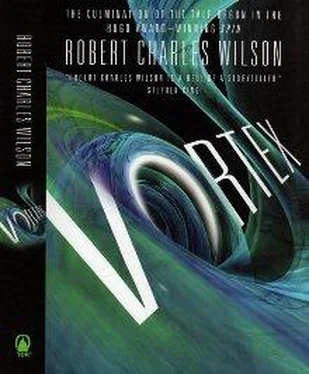“Thank you, Oscar, but no.”
He gave me a penetrating stare. “It’s too bad you didn’t make the decision to join the Network sooner. You’re very close, but I think you still fail to understand how lucky you are, how lucky we all are, to be alive at this moment of history.”
“I do understand,” I said. “And I appreciate the offer. But I’d rather face it alone.”
That was a lie. Worse, it was a mistake. He knew it was a lie. His suspicion flared. He said, “May I talk to you, just for a little while?”
So I had to ask him to come in, to sit down. While he gathered his thoughts I reminded myself that I couldn’t fool him (or the Coryphaeus) with an outright falsehood—it had been stupid to try. The best I could do was to tell the truth, selectively.
“Some of us in the managerial class have raised questions about you,” he said at last. “When you submitted to surgery, those voices were largely silenced. And now that we’re only hours away from— final events, the question is moot. But over time I’ve come to think of myself as your friend.” (He believed what he was saying.) “And as your friend it’s been a pleasure to watch you moving toward a real alignment with Vox. You’re almost there. It’s perfectly obvious. But you persist in hesitating, almost as if you were frightened of us.” He cocked his head. “ Are you frightened of us?”
The truth. “Yes,” I said.
“Vox isn’t just a polity. It’s a state of being. You feel that, don’t you?”
He was drawing a distinction between understanding and feeling, between the fact and my experience of it. “I do feel it,” I said. Also true. I felt it because of what was happening inside my head. The medics had explained this to me. There was a part of the brain called the medial prefrontal cortex, not strictly part of the limbic system. It modulated moral judgment, and it was the last area the node would infiltrate and manipulate. I said, “It feels like… well, like standing on the porch of a house on a winter night. There are people inside, and in a way they’re family…”
Oscar liked that: he beamed and smiled.
“But I can’t shake the thought that if I cross that door I won’t be welcome. Because they’ll know me for what I am.”
“What are you?”
“Different. Foreign. Ugly. Hateful.”
“Different in your history, but not in any way that matters.”
“You’re wrong about that, Oscar.”
“Am I? You can’t be sure until you let us know you.”
“I don’t want to be known.”
“Whatever it is you’re hiding from us, I promise it won’t make a difference to Vox.”
“What I’m saying, Oscar, is that I’m not an innocent man.”
“None of us is innocent.”
“I’m a murderer,” I said.
All true.
* * *
The burning man in his aura of blue fire:
I killed him because I was angry, because I was humiliated, or maybe just because a storm had blown through Houston on the heels of a record heat wave. Maybe there’s no point asking why.
In the dark, as oily rain sheeted off rooftops and plunged down gutters, I walked along an empty back street carrying a jug of methyl hydrate in a plastic bag. In my right pocket I had a box of matches, also wrapped in plastic, and, for insurance, a butane lighter the store clerk had told me was waterproof.
I was eighteen years old. I had taken public transit from the suburb where I lived with my parents, changing buses three times. There had been nobody on the last bus but a few sullen night-shift workers, and I hoped I looked like one more sodden and unlucky minimum-wager. The bus wound through an industrial park as grim as a prison compound. I got off and stood a moment under a bus stop sign, alone. The bus lumbered around a corner, belching diesel fumes; then the street was empty. The warehouse where my father ran his criminal enterprise was a couple of blocks away.
I didn’t know much about the business except that it had been the subject of arguments between my mother and my father, as far back as I could remember. I had spent some of my childhood in Istanbul, where we lived for six years—that was why my friends called me Turk. In Istanbul, as in Houston, we had lived in a comfortable part of town while my father worked in much less desirable neighborhoods. My mother was a Louisiana Baptist by heritage and she had never gotten accustomed to the mosques, the burqas—even though Istanbul was a cosmopolitan city and we lived in a Westernized district. For a while I thought that was why they argued so often. But the arguments continued after we moved back to the States. And although they tried to keep it from me, I eventually understood that it wasn’t the long hours or the foreign interludes of my father’s work that upset my mother, it was the nature of the work itself.
Her shame and discomfort were expressed in small ways. She wouldn’t answer the phone unless the call came from a known number. We seldom visited relatives on either side of the family, nor were we visited by them. As the years passed, my mother grew quiet, sullen, withdrawn. Once I hit adolescence I began to spend more time out of the house—as much as possible. Better the street than these drawn curtains and whispered conversations.
Maybe that makes it sound worse than it was. We were at least superficially comfortable. We had money; I went to a decent school. Furtive though my father’s business might be, he was successful at it. I overheard argumentative phone calls in which he inevitably prevailed. Sometimes men in neatly pressed suits came to see him, and they spoke to him softly and deferentially. I had occasionally wondered whether my father might be a criminal, but the idea seemed ludicrous on the face of it. I guessed he might be operating on the far side of some trivial law, maybe dodging taxes or import duties, but I had learned from television and the Internet that such behavior could be lovable and even, looked at in the right light, heroic. The Spin years had taught us that when the rules break down it’s root hog or die; and in those days you did what you had to do to keep a family together and food on the table.
I loved my father. I told myself so, and I believed it. It was only later that I collided with his disdain for conventional ethics, his pathological need to be obeyed.
The sluicing rain was useful cover. My father’s business was housed in a building older than the Spin, a twentieth-century building with brick walls and small high windows of green leaded glass. It fronted on this dreary street, but the real work was conducted from the rear, where the loading bays were. My father had taken me here twice before, against my mother’s objections, to give me a sanitized tour of the warehouse—he may have hoped to bring me into the business at some point in the future. And I had scouted the area myself just two days ago, working out a plan. I cut down a narrow passage between two adjoining buildings to the laneway at the back. Long ago, a railway spur had serviced these warehouses. The spur line had been paved over but the asphalt had scabbed away in places to reveal the old steel rails, glittering in the smoky orange light of the street lamps. The rain was coming down pretty hard but I could hear the slosh of flammable liquid in the jug I was carrying.
Last year I had fallen in love with a girl named Latisha Philips—fallen in love the way a seventeen-year-old falls in love, stupidly, wholeheartedly. Latisha was an inch taller than I was and so sweetly good-looking that I woke up most mornings afraid she’d figure out she could do better than Turk Findley. She was smart, too. If scholarship programs hadn’t been cut to the bone during the post-Spin austerity drives, she might have qualified for an Ivy League college. She wanted to be a marine biologist. She wanted to save the oceans from acidification. She attended local protests against the sulfur-aerosol launches.
Читать дальше












